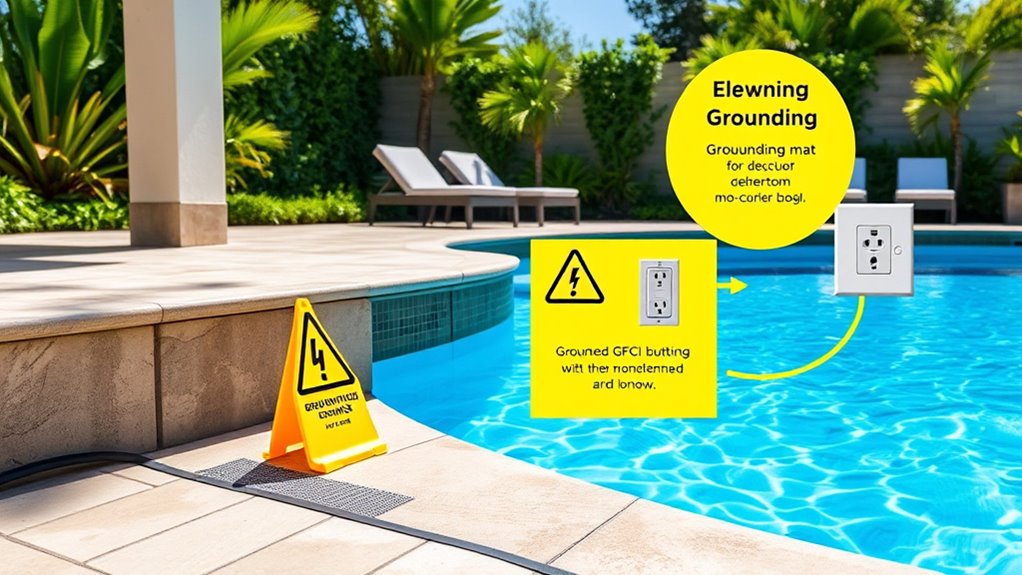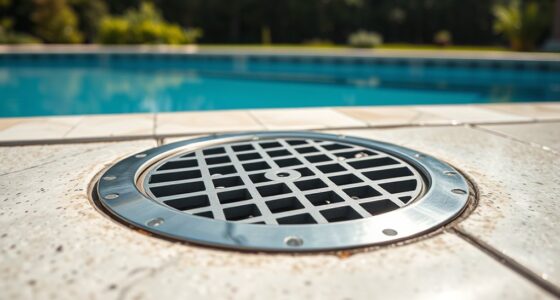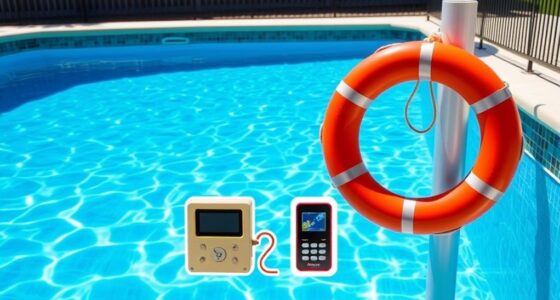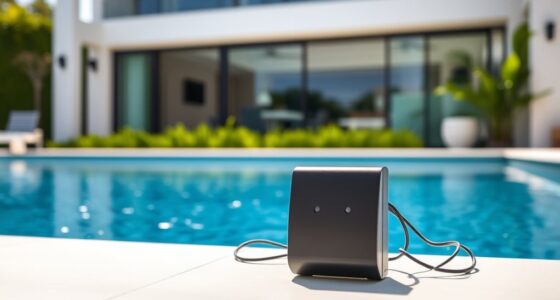To stay safe around pools, make sure your electrical systems are properly installed by a licensed electrician using weatherproof wiring and GFCIs to prevent shocks. Keep electrical devices at least 10 feet from water and regularly inspect all cords and outlets for damage. Always use outdoor-rated equipment and test GFCIs frequently. Staying aware of safety practices, like avoiding electrical devices during storms, helps protect you. If you want to learn more, you’ll find helpful tips to keep everyone safe and secure.
Key Takeaways
- Always hire a licensed electrician for pool wiring and ensure compliance with local codes.
- Install GFCIs on all outdoor outlets and test regularly to prevent electrical shocks.
- Keep electrical devices at least 10 feet away from the pool’s edge and water.
- Use waterproof, outdoor-rated wiring and conduits to protect against moisture and weather damage.
- Conduct routine inspections of cords, outlets, and equipment for damage or corrosion to maintain safety.
Proper Installation of Pool Electrical Systems

To guarantee safety around your pool, you need to start with proper installation of electrical systems. First, hire a licensed electrician experienced in pool wiring. They’ll ensure all electrical components comply with local codes and standards. Use waterproof, outdoor-rated wiring and conduit to protect against moisture and weather. Install a dedicated circuit with a ground-fault circuit interrupter (GFCI) to prevent electrical shocks. Keep all wiring away from water and pool equipment, and make sure that electrical outlets are at a safe distance from the pool’s edge. Proper grounding is essential to prevent electrical faults. Regular inspections and maintenance are vital to spot any damage or deterioration early. Following these steps helps minimize risks and keep everyone safe while enjoying your pool.
Using Ground-Fault Circuit Interrupters (GFCIs)

Ground-fault circuit interrupters (GFCIs) are vital safety devices that protect you from electrical shocks around pools. They detect small imbalances in electrical current and shut off power instantly, preventing shocks before they happen. Installing GFCIs on outlets near your pool, including those connected to pumps, lights, and heaters, is essential. Imagine walking barefoot on wet surfaces, knowing that GFCIs are ready to trip if a faulty wire or leak occurs. They act as a safety net, reducing the risk of electrocution. Keep in mind:
- GFCIs monitor electrical flow continuously
- They trip within milliseconds if a leak is detected
- Installed on outdoor outlets and circuit breakers
- Require regular testing to ensure proper functioning
- AI security developments have led to enhanced cybersecurity measures for protecting smart pool systems. Additionally, ensure that proper maintenance of GFCIs is performed regularly to sustain their effectiveness, as electrical safety is critical in outdoor environments.
Maintaining Safe Distance From Electrical Devices

Maintaining a safe distance from electrical devices is essential for preventing accidents around pools. Keep all electrical equipment, such as pool lights, pumps, and timers, at least 10 feet away from the water’s edge. Avoid plugging devices in close to the pool area, and never operate electrical appliances near the water. Use outdoor-rated cords and outlets, and ensure they are positioned away from splashes or standing water. When working with electrical devices, stand on dry ground and keep your hands dry. Be mindful of extension cords—only use those designed for outdoor use and keep them away from the pool. Staying vigilant about distance helps reduce the risk of electrical shock and keeps everyone safe. Additionally, understanding the importance of proper insulation and using Ground Fault Circuit Interrupters (GFCIs) can further enhance safety around electrical devices near pools. Regularly inspecting electrical components for wear and damage is also crucial to ensure ongoing safety. Incorporating electrical safety standards can help prevent potential hazards and promote a safe swimming environment. Being aware of the shelf life of electrical equipment can also prevent malfunctions that lead to dangerous situations. Moreover, staying informed about advancements in electrical safety technology can provide additional protection and peace of mind.
Regular Inspection and Maintenance of Electrical Equipment

Regular inspection and maintenance of electrical equipment are essential for ensuring safety around pools. You need to regularly check cords, outlets, and fixtures for signs of damage or wear. Ensure that all connections are secure and free from corrosion. Test GFCI outlets frequently to confirm they trip properly, providing protection against electrical shocks. Clean debris or dirt that may accumulate on equipment, preventing malfunctions. Schedule professional inspections annually to identify hidden issues before they become hazards. Proper maintenance reduces the risk of electrical faults that could cause shocks or fires. Staying vigilant with routine upkeep keeps your pool area safe and compliant with safety standards. Additionally, understanding the electrical components involved can help you identify potential issues early. Regularly reviewing safety guidelines ensures you stay informed about best practices for pool electrical safety. Being aware of proper grounding techniques also contributes significantly to preventing electrical accidents. Incorporating preventive maintenance practices can further enhance safety and equipment longevity. Implementing power surge protection can safeguard your electrical systems from unexpected voltage spikes that may cause damage.
Important Safety Practices for Pool Users

To guarantee safety around pools, it’s essential that you follow crucial practices while swimming or using pool equipment. Always stay aware of your surroundings and avoid touching electrical devices or outlets near water. Keep electrical appliances away from the pool area, and never plug in new devices without checking for proper grounding. Use ground-fault circuit interrupters (GFCIs) for all outdoor outlets and equipment to prevent shocks. Never swim during a storm or when electrical work is being done nearby. Make sure pool lights and equipment are properly maintained and inspected regularly. Educate yourself on safety signs and rules, and always supervise children closely. Be aware of regulatory compliance issues related to electrical safety, and ensure all safety measures are up to date. Proper maintenance practices of electrical devices in pool areas significantly reduce the risk of electrical hazards. Regular inspection protocols help identify potential issues before they become dangerous. Additionally, understanding cybersecurity vulnerabilities associated with pool equipment can help prevent digital threats that might compromise safety systems. Staying informed about technological advancements in pool safety equipment can also enhance overall protection. Following these safety practices helps prevent accidents and ensures a safe, enjoyable swimming experience for everyone.
Frequently Asked Questions
Can Solar-Powered Pool Equipment Pose Electrical Safety Risks?
Solar-powered pool equipment can pose electrical safety risks if not installed or maintained properly. You might encounter issues like electrical shocks or fires if wiring isn’t correctly insulated or grounded. To avoid these dangers, make certain a qualified electrician handles the installation, and regularly inspect your system. Proper maintenance and adherence to safety standards keep your solar-powered equipment safe and efficient around your pool.
Are There Specific Safety Tips for Above-Ground Pool Electrical Setups?
Imagine a quiet backyard, where shimmering water hides hidden dangers. When setting up above-ground pools, you must prioritize safety. Always use GFCI outlets, keep electrical connections dry, and avoid extension cords. Position equipment away from water, and regularly inspect cords for damage. These steps create a safe oasis, where fun doesn’t turn into danger, ensuring your above-ground pool remains a source of joy, not risk.
How Does Weather Impact Electrical Safety Around Pools?
Weather can considerably impact electrical safety around pools. Storms, rain, and lightning increase the risk of electrical shock or short circuits. You should always turn off electrical equipment during storms and avoid using electrical devices near the water when bad weather is approaching. Regularly inspect your electrical systems for damage, and make sure all outdoor outlets are weatherproof. Staying vigilant and prepared helps keep you safe regardless of weather conditions.
What Should I Do if I Suspect Electrical Shock Near the Pool?
Remember, “Better safe than sorry.” If you suspect an electrical shock near the pool, immediately get everyone out of the water and away from the source. Turn off the electrical power at the main breaker if possible. Call emergency services right away. Don’t attempt to re-enter the water or handle electrical equipment until professionals confirm it’s safe. Your quick action can save lives.
Are There Age Restrictions for Operating Electrical Pool Equipment?
You might wonder if there are age restrictions for operating electrical pool equipment. Generally, only trained and authorized individuals should handle such equipment, regardless of age. Young children or teens shouldn’t operate electrical devices around pools unless supervised by an adult familiar with safety protocols. Always follow manufacturer instructions and local regulations. If you’re unsure, consult a professional or your local authority to guarantee safety and compliance.
Conclusion
By following these safety tips, you can enjoy your pool safely and confidently. Proper installation, GFCIs, safe distances, and regular checks are your best defenses against electrical hazards. Remember, isn’t your safety worth every precaution? Stay vigilant, respect the electrical systems around your pool, and make certain everyone has a fun, worry-free experience. After all, a safe pool environment begins with you—so take these steps seriously and swim with peace of mind.









